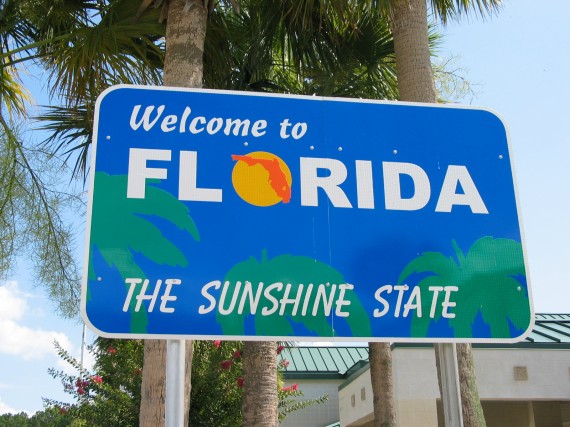GOP Losing Cuban-American Vote Too
A new poll suggests that Republicans could be losing a constituency that is very key for them in the nation's third most populous state.
While Republicans have seen their standing among most Latino voters collapse over the past decade, the one group where support for the GOP has been relatively solid is among Cuban Americans, especially Cuban Americans located in Florida. To a large degree, of course, this support is rooted in anti-Castro sentiments and the belief among the Cuban community that conservatives have been more outspoken against the repression of the Castro regime over the years. Whatever the reason, however, that Cuban support has allowed Republicans to push back on the claim that they are out of touch with Latinos and, most importantly, to remain competitive on the statewide level in Florida.
If a new Pew Research Survey is correct, though, then the GOP could have some serious problems among Cuban American voters and, by extension, serious problems in Sunshine State:
The Republican party is losing support among U.S. Cubans as a growing number are shifting their support toward Democrats, according to a Pew Research Center analysis released on Tuesday.
Less than half (47 percent) of Cuban registered voters nationwide identified or were leaning toward the Republican Party, compared to 64 percent ten years ago. Meanwhile, the share of U.S. Cubans leaning or identifying with Democrats climbed doubled from 22 percent to 44 percent.
According to Pew Hispanic Research’s Jens Manuel Krogstad, there is a generational shift in these numbers.
“The impact of younger Cubans is reflected in those figures. Over half (56%) of Cubans ages 18 to 49 identified with or leaned toward the Democratic Party compared with 39% of those 50 years and older,”said Krogstad.
More details from the poll itself:
The shift is partly explained by the coming of age of U.S.-born Cubans, who have somewhat different political affiliations than their elders. Today, 44% of Cubans in the U.S. are native-born. Some 48% of Cubans ages 18 to 49 were born in the U.S., compared with 11% of Cubans who are 50 years and older.
The shift is also partly explained by the different waves of Cuban immigrants who have arrived in the U.S.—more than half of Cuban immigrants arrived after 1990. Between 2000 and 2010, the annual average growth of the Cuban immigrant population was 17,300, according to a Pew Research Center analysis of Census Bureau data.
Looking at all Cubans, including those not registered to vote, only a third say they identify with or lean toward the Republican Party, according to the 2013 survey of Hispanics. On the other side of the aisle, some 48% of Cubans today say they identify with or lean toward the Democratic Party.
The impact of younger Cubans is reflected in those figures. Over half (56%) of Cubans ages 18 to 49 identified with or leaned toward the Democratic Party compared with 39% of those 50 years and older. Conversely, older Cubans tend to identify with or lean toward the Republican Party more than younger Cubans, by 44% to 23%. Even so, the share of older Cubans who are Republican has declined over time. In 2002, among all Cubans, some 68% who were 50 and older said they identified with or leaned toward the Republican Party.
In other words, what’s happening among Cuban voters is to a large degree a reflection of what has happened among other Latino groups, among immigrant groups in general, and among the American electorate as a whole. For what may be different reasons, younger generations are tending to identify more with the Democratic Party than the Republican Party. This is a problem the GOP has been dealing with for years now, of course, and it can largely be attributed to the party’s stand on social issues as well as the general impression that the GOP as a whole doesn’t care about the economic issues that impact people’s daily lives. Whether these perceptions are accurate or not, they are motivating voter choices and they are doing so among a voting cohort that is likely to stick with its “first choice” party for some time to come absent some major shift in the political culture. In the case of young Cuban Americans, one suspects that a lot of what is going on here is the fact that second and third generation Americans are finding themselves feeling more American and less Cuban, and placing far less importance on what a politician thinks about Fidel and Raul Castro than their elders have in the past. They, of course, are the future of the Cuban American vote in Florida and around the nation.
The electoral implications of this are potentially huge. For some time now, Republican success in statewide in elections in Florida, and in the Sunshine State in Presidential Election years, has been the party’s strength with the Cuban American community, which helped to off set Democratic advantages among other minority groups and combined with GOP support among whites to produce a fairly good track record of victory. If Cuban Americans in Florida start shifting Democratic, then the GOP will have real problems winning statewide, and even bigger problems winning the White House. Right now, Democrats seem to have an Electoral College lock on five states at the top of the list in Electoral Votes — California (55 Electoral Votes), New York (which ties with Florida at 29 Electoral Votes), Pennsylvania, (20 Electoral Votes), Illinois (20 Electoral Votes, and Michigan (16 Electoral Votes) — for a total of 140 Electoral Votes. Additionally President Obama has won Florida (29 Electoral Votes) and (18 Electoral Votes) in each of the last two elections. If Florida now becomes a Democratic “lock” in most Presidential years, that gives a Democratic Presidential candidate 169 Electoral Votes without breaking a sweat, and they’d need just another 101 Electoral Votes to win the election. Without Florida, meanwhile, the GOP would find itself in very big trouble in the Electoral College.







This is not surprising, the elderly Cubans are anti Castro Cubans while the native born are Americans.
I have to say, Doug, that your quarterly kvetch about the economy posts have gotten much better. But sometime you should do a post on why you think this impression of the GOP on economic issues might not be accurate. I think a lot of us would find such a discussion interesting and informative.
I worked with an old Cuban guy in Florida who was sure that once Castro was dead, he was going to be able to go back and pick up his old life in Cuba, complete with all the property he used to own. His whole mindset was that he was a Cuban and would go back and finish out his life there. He was a truly one issue voter and felt that the Republicans supported his stance more than the Democrats. I would bet that young Cuban-Americans born in this country vote based on a wider variety of issues that affect their lives here since they aren’t hoping to move to Cuba.
Fixed that up for you…..
The only good part is, once the R have lost the electoral college for good, there’s a chance we will finally see a direct election of the president.
@Mu:
If there is only one party, what is the point of direct election of the president. The real issue is whether the Democrats will reorganize their primary slate so that more states than Iowa and New Hampshire have a meaningful say in the deciding who will be the next president.
Also, if the Democratic Party is the only party that matters, then primaries need to be shifted to the late spring, early summer so that there is not such a long period of the outgoing president being a lame duck.
SD, I’m a big proponent of “one man, one vote”, not one man and somewhere between 0.51 and 1.2 votes depending on the way your state votes and assigns its electoral college delegates.
Same as I would have a computer chop up states into voting districts simply under a “minimize border length for a given population” to end gerrymandering.
@superdestroyer:
Three points:
(1) there are two parties (sorry but the others are irrelevant except when they screw up an election (e.g. Ross Perot, Ralph Nader), and there will never be “only one party.”
(2) Iowa’s primary system – no vote just bogus caucuses – is a disgrace.
(3) I wish there was no Republican Party so that there would actually be “only one party.”
@beth: A large percentage of the Miami Cubans are the .,01% plutocrats who were responsible for the revolution to begin with. Perhaps there is something we could learn from that. This .01% thinks so.
What happens when Texas turns blue? Probably by 2024 given current demographics.
@EddieInCA:
The U.S. willl be functioning as a one party state well before Texas turns blue. By the time Texas turns blue, the Republicans will be totally irrelevant in Ohio, Virginia, Colorado, Wisconsin, and probably North Carolina.
Instead of thinking about the changing voter patterns in terms of their effect on the irrelevant Republicans, maybe everyone should think about the impact on the Democrats and how the Democrats govern. What does happens when the Democratic Party primary is the only relevant election and the general election is just a rubber stamp of the primary results. How far to the left can the Democratic Party go. What is the impact of all of the former Republicans when they start voting in the Democratic primary. How high will taxes go to fund all of the programs demanded by those young, liberal voters?
It is amazing how pundits want to view demographic and political changes through the prism of the irrelevant Republicans instead of focusing on the dominant party that actually controls policy and governance.
Citizens constantly bitch and gripe and moan and groan about Iowa caucuses, New Hampshire primaries and the Electoral College…
Here…do something about it.
@EddieInCA: I don’t know if it’s going to take that long, Dallas is already blue and Houston has an openly gay female mayor.
OT, but whee, I really think we’ve jumped the shark with this one. Is it something in the water?
@Mr. Coffee:
I have no problem with New Hampshire’s primary.
Iowa remains a disgrace, however, the people of Iowa like it that way.
@al-Ameda: I hate the caucus since I am not registered to a party I cannot take part, the independent caucus is a joke, and I won’t register for a party because we have closed primaries.
@superdestroyer:
That would only be potentially true if the Republican party were completely unwilling to alter it’s platform to attract more voters. You seem to be of the opinion that we’ve had the same exact two parties since the founding of this country and neither of them (or at least one of them) has not changed one whit with changing social mores or economic realities.
@Grewgills:
Altering their positions, whatever they are and how ever the public perceives them, to get more poor, minority, and urban voters is just another way of saying that if the Republicans just become Democrat-lite, then they will survive.
This position totally ignores the lack of talent in the Repubican Party, that the number of automatic Democratic Party voters is growing regardless of the positions held by either party, and how culture and ethnicity affects political positions.
The Republicans could come out for reparations and I doubt if more than 1% of the black voters would change their voting habits. Voting for Democrats is just part of black (and Latino, Jewish, Homosexuals, and academic) culture in the U.S. and there are no positions that the Republicans can take that would attract more votes than it would lose.
What is amazing is anyone who can count can see that the Republicans are on the downslope to extinction. I suspect in a few years all of the cheap labor, country club Republicans will just move over and vote in the relevant Democratic primaries rather than stay with the totally irrelevant Republicans. That just leaves idiot social conservatives like Todd Akin who just do not care about winning elections, affecting policy, or governing.
@Mu:
If there is only one party, the idea of one man, one vote for president is moot. What really happens is that the vote of the citizens in Iowa and New Hampshire are outsized versus the vote of citizens of the last 40 states to have a primary.
What is amazing is that Democrats scream about voting rights but then want a system where caucus attendees in Iowa are the most important people in the U.S. to selecting the next president in the coming one party state.
Excellent way of describing, and fastidious article to take information about my presentation subject matter, which i am going to present in institution of higher
education.